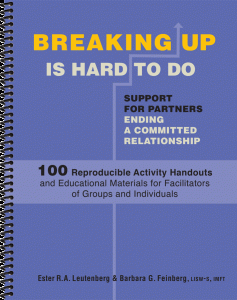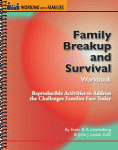The Breakup Experience
A committed relationship in this article is defined as one based on mutually agreed-upon parameters that might involve exclusivity, honesty, openness, loyalty, trust and other implicit and explicit characteristics. Forms of committed relationships can be varied and might be short or long-term. These commitments may be reflected in domestic partnerships, religious and civil unions, single-sex and heterosexual couples living together, commuter (or long distance) marriages, and other arrangements.
 Couples become separate entities when they break up and must chart their individual ways. Loss of a relationship can mean the end of dreams, routines, stability, emotional and financial security, companionship, and family as it existed before the breakup. The resulting trauma is one that impacts on the partners, of course. To varying degrees, children, extended family, friends and colleagues suffer from and grieve the loss as well.
Couples become separate entities when they break up and must chart their individual ways. Loss of a relationship can mean the end of dreams, routines, stability, emotional and financial security, companionship, and family as it existed before the breakup. The resulting trauma is one that impacts on the partners, of course. To varying degrees, children, extended family, friends and colleagues suffer from and grieve the loss as well.
In addition to grieving the loss, those in the midst of ending a committed relationship face a great many practical challenges:
- Children
- Parenting
- Housing
- Finances
- Legalities
- Division of property
- Establishing an independent life
The legal break up of couples through divorce adds significantly to the complexity of working through the emotional and practical issues inherent in the process. Divorce involves legal considerations, binding agreements, and an economic reality that can alter the expectations and security of all family members.
Ending a committed relationship is an extended process with different phases. Educating your clients about this progression is an important part of working through the confusing, challenges and difficult experiences of breaking up. The following are phases your clients might encounter:
- Significant relationship distress over time
- Increased distance from each other
- Confrontation(s) with partner and family
- Permanent or temporary separation
- Temporary reconciliation
- Decision to end the relationship permanently
- Selection of legal representation in the case of a divorce
- Negotiations for the financial break up
- Creation of a co-parenting plan
- Day by day co-parenting
- Creating a new, single life
Divorce is a legal dissolution of a marriage by a court or other competent body. Many of the same concerns involved in divorce can apply to domestic partners and others in a committed relationship even though resolving legal issues associated with marriage may not be necessary. Laws governing divorce differ from state to state, and from country to country. Facilitators need to be particularly sensitive to the cultural differences that may have a significant impact on the way in which individuals, families and communities think about and handle divorce.
The following will help your clients work through these tough issues.
Discuss these aspects about your client’s present situation:
Trust – How safe do you feel emotionally? How safe do you feel physically?
Safety – How safe do you feel sexually?
Love – Is your love romantic, platonic, intermittent, evaporating, or other?
Cooperation – How do you help each other with day-to-day responsibilities?
Respect – What level of respect does your partner have for you? What level of respect do you have for your partner?
Physical intimacy – How are you and your partner “in sync” about intimacy and sex? How are you and your partner not “in sync” about intimacy and sex? How would you describe your sex life?
Communication – Do you talk to each other about finances? Are you only sharing information or are you able to discuss feelings, worries and excitement?
Values – How much do you agree on ethical and moral issues? How does that influence your relationship?
Religion and spirituality – Describe how you share a religious and/or spiritual belief system. If you do not, describe how that works in your relationship.
Raising children – If you have children, describe how you have or have not been able to find common ground regarding discipline, guidance, medical decisions, educational plans and goals.
Family-of-origin relationships – Do you believe you and/or your partner are more loyal to your own families-of-origin than to each other?
In-Law relationships – How have you or have you not worked out relationships that avoid high levels of conflict with each other’s families? Do you have close relationships with your in-laws? Is that likely to continue if your relationship breaks up? Why or why not?
Finances – Are you both contributing to the family economy, either by working outside the home or inside? How does that work for you? How do you agree or disagree on methods of spending money? How do you agree or disagree on a budget or saving money?
Arguing – Do you and your partner stick to the issue at hand when you argue? Do you or your partner bring up wrong-doings of the past when arguing? Does your fighting ever become physical? When you are arguing with your partner, how safe does everyone in your family feel?
Future – How do you believe your life (and that of your children, if applicable) would be better without this committed relationship? How do you believe your life (and that of your children, if applicable) would be worse without this committed relationship? Explain.
Discuss which answers were surprises. What is the take-away for your client?
 Ending a committed relationship is very difficult, full of twists and turns and unexpected potholes. As you help your participant on their personal journey the following worksheets (from the workbook, Breaking Up Is Hard To Do) will help them clarify their position. The worksheet versions of To Stay or Go, Being Left, The Quality of Current Relationship, and Goals are available to download here.
Ending a committed relationship is very difficult, full of twists and turns and unexpected potholes. As you help your participant on their personal journey the following worksheets (from the workbook, Breaking Up Is Hard To Do) will help them clarify their position. The worksheet versions of To Stay or Go, Being Left, The Quality of Current Relationship, and Goals are available to download here.

